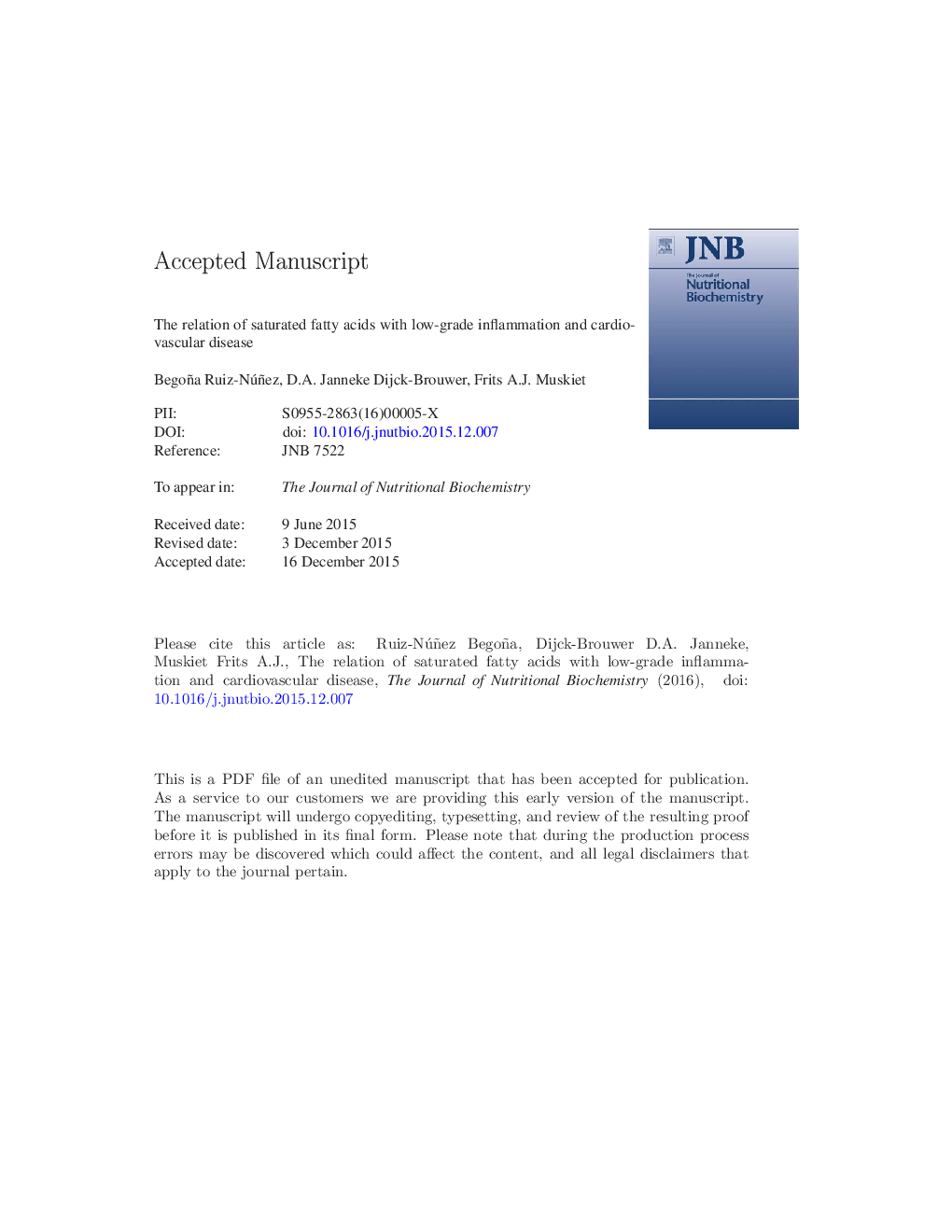| کد مقاله | کد نشریه | سال انتشار | مقاله انگلیسی | نسخه تمام متن |
|---|---|---|---|---|
| 1989563 | 1540632 | 2016 | 78 صفحه PDF | دانلود رایگان |
عنوان انگلیسی مقاله ISI
The relation of saturated fatty acids with low-grade inflammation and cardiovascular disease
ترجمه فارسی عنوان
رابطه اسیدهای چرب اشباع با التهاب کم و بیماری قلبی عروقی
دانلود مقاله + سفارش ترجمه
دانلود مقاله ISI انگلیسی
رایگان برای ایرانیان
کلمات کلیدی
SCFAHDL-CCLATLRMCFAAHALBPHPGHDLSFAGPRMUFARCTLDL-CVLDLDNLLPSDM2LBP, lipopolysaccharide-binding proteinEPANAFLDG-protein-coupled receptor - G-پروتئین گیرندهhigh-density lipoprotein - HDL یا لیپوپروتئین با دانسیته بالا یا چگالی بالاNFκB - NFKBRandomized controlled trial - آزمایش تصادفی کنترل شدهde novo lipogenesis - از لیپوژنز جدیدnonalcoholic steatohepatitis - استاتو هپاتیت غیر الکلیEicosapentaenoic acid - اسید ایکوزاپنتانوئیکdocosahexaenoic acid - اسید داکوزاگزوائونیکLinoleic acid - اسید لینولئیکconjugated linoleic acid - اسید لینولئیک کونژوگهPolyunsaturated fatty acids - اسید چرب اشباع نشدهPUFA - اسید چرب چند غیراشباعFatty acids - اسیدهای چربsaturated fatty acids - اسیدهای چرب اشباع شدهmonounsaturated fatty acids - اسیدهای چرب غیر اشباعMedium-chain fatty acids - اسیدهای چرب متوسطShort-chain fatty acids - اسیدهای چرب کوتاه مدتAmerican Heart Association - انجمن قلب آمریکاGlycemic load - بار گلیسمیCho - برایcoronary artery disease - بیماری عروق کرونرcardiovascular disease - بیماری قلب و عروقیNonalcoholic fatty liver disease - بیماری کبدی چربی غیر الکلیtriglyceride - تریگلیسریدToll-like receptor - تیالآرImmune system - دستگاه ایمنی یا سیستم ایمنیDHA - دوکوساهگزائنوئیک اسیدType 2 diabetes mellitus - دیابت نوع دوCVD - رسوب دهی شیمیایی بخار Glycemic index - شاخص گلیسمیکnuclear factor kappa B - فاکتور هسته ای کاپا Bvery low-density lipoprotein - لیپوپروتئین بسیار کم چگالیLow-density lipoprotein - لیپوپروتئین کم چگالی یا الدیال LDL - لیپوپروتئین کم چگالی(کلسترول بد)lipopolysaccharide - لیپوپلی ساکاریدMESA - مازاMetabolism - متابولیسم Multi-Ethnic Study of Atherosclerosis - مطالعه چند قومی آترواسکلروزHPA - میلی بار یا هکتوپاسکالNash - نوشhypothalamus-pituitary-adrenal - هیپوتالاموس-هیپوفیز-آدرنالC-reactive protein - پروتئین واکنشی سیCRP - پروتئین واکنشی سی یا سی. آر. پی saturated fat - چربی های اشباع شدهCarbohydrates - کربوهیدرات هاcholesterol - کلسترولtotal cholesterol - کلسترول تامHigh-density lipoprotein-cholesterol - کلسترول لیپوپروتئین با چگالی بالاLow-density lipoprotein-cholesterol - کلسترول لیپوپروتئین با چگالی کم
موضوعات مرتبط
علوم زیستی و بیوفناوری
بیوشیمی، ژنتیک و زیست شناسی مولکولی
زیست شیمی
چکیده انگلیسی
The mantra that dietary (saturated) fat must be minimized to reduce cardiovascular disease (CVD) risk has dominated nutritional guidelines for decades. Parallel to decreasing intakes of fat and saturated fatty acids (SFA), there have been increases in carbohydrate and sugar intakes, overweight, obesity and type 2 diabetes mellitus. The “lipid hypothesis” coined the concept that fat, especially SFA, raises blood low-density lipoprotein-cholesterol and thereby CVD risk. In view of current controversies regarding their adequate intakes and effects, this review aims to summarize research regarding this heterogenic group of fatty acids and the mechanisms relating them to (chronic) systemic low-grade inflammation, insulin resistance, metabolic syndrome and notably CVD. The intimate relationship between inflammation and metabolism, including glucose, fat and cholesterol metabolism, revealed that the dyslipidemia in Western societies, notably increased triglycerides, “small dense” low-density lipoprotein and “dysfunctional” high-density lipoprotein, is influenced by many unfavorable lifestyle factors. Dietary SFA is only one of these, not necessarily the most important, in healthy, insulin-sensitive people. The environment provides us not only with many other proinflammatory stimuli than SFA but also with many antiinflammatory counterparts. Resolution of the conflict between our self-designed environment and ancient genome may rather rely on returning to the proinflammatory/antiinflammatory balance of the Paleolithic era in consonance with the 21st century culture. Accordingly, dietary guidelines might reconsider recommendations for SFA replacement and investigate diet in a broader context, together with nondietary lifestyle factors. This should be a clear priority, opposed to the reductionist approach of studying the effects of single nutrients, such as SFA.
ناشر
Database: Elsevier - ScienceDirect (ساینس دایرکت)
Journal: The Journal of Nutritional Biochemistry - Volume 36, October 2016, Pages 1-20
Journal: The Journal of Nutritional Biochemistry - Volume 36, October 2016, Pages 1-20
نویسندگان
Begoña Ruiz-Núñez, D.A. Janneke Dijck-Brouwer, Frits A.J. Muskiet,
